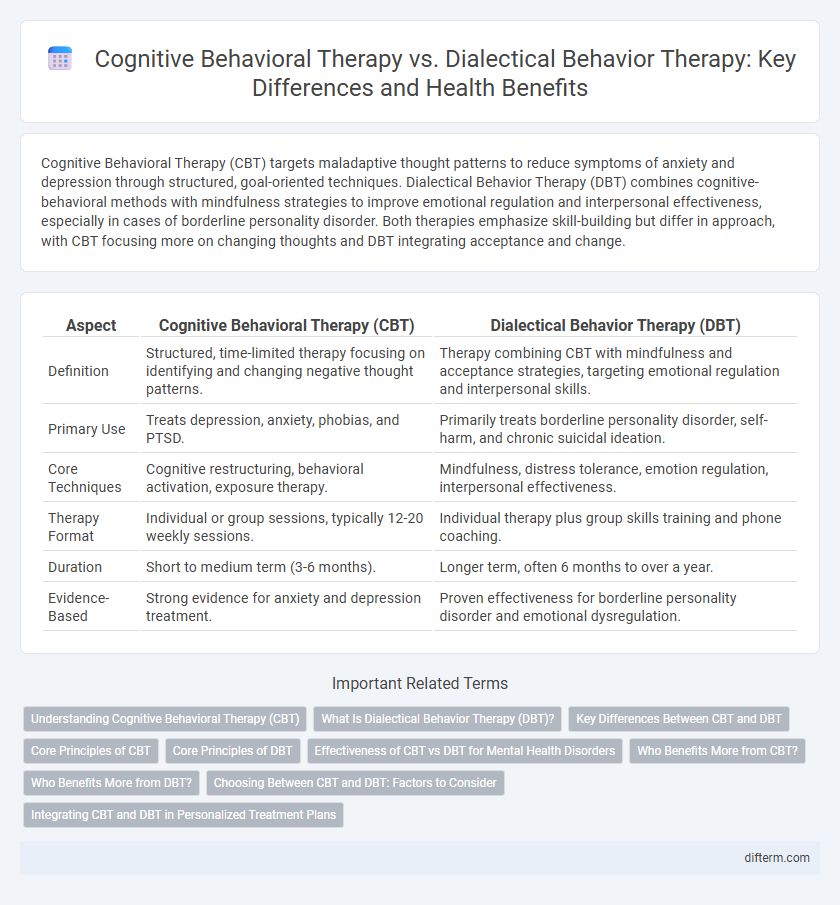Cognitive Behavioral Therapy (CBT) targets maladaptive thought patterns to reduce symptoms of anxiety and depression through structured, goal-oriented techniques. Dialectical Behavior Therapy (DBT) combines cognitive-behavioral methods with mindfulness strategies to improve emotional regulation and interpersonal effectiveness, especially in cases of borderline personality disorder. Both therapies emphasize skill-building but differ in approach, with CBT focusing more on changing thoughts and DBT integrating acceptance and change.
Table of Comparison
| Aspect | Cognitive Behavioral Therapy (CBT) | Dialectical Behavior Therapy (DBT) |
|---|---|---|
| Definition | Structured, time-limited therapy focusing on identifying and changing negative thought patterns. | Therapy combining CBT with mindfulness and acceptance strategies, targeting emotional regulation and interpersonal skills. |
| Primary Use | Treats depression, anxiety, phobias, and PTSD. | Primarily treats borderline personality disorder, self-harm, and chronic suicidal ideation. |
| Core Techniques | Cognitive restructuring, behavioral activation, exposure therapy. | Mindfulness, distress tolerance, emotion regulation, interpersonal effectiveness. |
| Therapy Format | Individual or group sessions, typically 12-20 weekly sessions. | Individual therapy plus group skills training and phone coaching. |
| Duration | Short to medium term (3-6 months). | Longer term, often 6 months to over a year. |
| Evidence-Based | Strong evidence for anxiety and depression treatment. | Proven effectiveness for borderline personality disorder and emotional dysregulation. |
Understanding Cognitive Behavioral Therapy (CBT)
Cognitive Behavioral Therapy (CBT) targets negative thought patterns to modify behaviors and improve emotional regulation through structured, goal-oriented sessions. It is evidence-based for treating anxiety, depression, and stress-related disorders by promoting skills like cognitive restructuring and exposure techniques. CBT emphasizes the link between thoughts, feelings, and behaviors, enabling patients to develop healthier coping mechanisms.
What Is Dialectical Behavior Therapy (DBT)?
Dialectical Behavior Therapy (DBT) is a structured cognitive-behavioral treatment originally designed to help individuals with borderline personality disorder manage intense emotions and improve interpersonal effectiveness. DBT integrates mindfulness, distress tolerance, emotion regulation, and interpersonal skills training to reduce self-destructive behaviors and enhance emotional resilience. This therapy emphasizes balancing acceptance and change, making it effective for a range of mental health conditions, including depression, anxiety, and suicidal ideation.
Key Differences Between CBT and DBT
Cognitive Behavioral Therapy (CBT) primarily targets distorted thinking patterns and maladaptive behaviors to alleviate symptoms of anxiety and depression, emphasizing skill development in problem-solving and cognitive restructuring. Dialectical Behavior Therapy (DBT) integrates CBT techniques with mindfulness and emotional regulation strategies, specifically designed for individuals with borderline personality disorder and chronic suicidal ideation. Key differences include DBT's focus on acceptance and validation alongside change, the inclusion of group skills training, and its emphasis on interpersonal effectiveness compared to CBT's broader application to various mental health disorders.
Core Principles of CBT
Cognitive Behavioral Therapy (CBT) centers on identifying and restructuring negative thought patterns to influence emotional regulation and behavior positively. It employs techniques such as cognitive restructuring, behavioral activation, and skills training to address maladaptive thinking and improve mental health outcomes. Emphasizing the connection between thoughts, feelings, and actions, CBT aims to empower patients to develop practical coping strategies for long-term psychological resilience.
Core Principles of DBT
Dialectical behavior therapy (DBT) centers on balancing acceptance and change through mindfulness, distress tolerance, emotion regulation, and interpersonal effectiveness skills. Unlike cognitive behavioral therapy (CBT), which targets altering dysfunctional thoughts and behaviors, DBT emphasizes validation of patients' experiences alongside behavioral modifications. The core principles of DBT address emotional dysregulation by combining cognitive strategies with dialectical philosophies, particularly beneficial for borderline personality disorder and self-harm behaviors.
Effectiveness of CBT vs DBT for Mental Health Disorders
Cognitive Behavioral Therapy (CBT) and Dialectical Behavior Therapy (DBT) both demonstrate high effectiveness in treating mental health disorders, with CBT primarily targeting depression and anxiety by modifying negative thought patterns. DBT proves particularly effective for borderline personality disorder and emotion regulation issues, combining cognitive-behavioral techniques with mindfulness and distress tolerance strategies. Studies show CBT reduces symptoms in mood and anxiety disorders significantly, while DBT excels in decreasing self-harm behaviors and improving interpersonal functioning.
Who Benefits More from CBT?
Cognitive Behavioral Therapy (CBT) is particularly beneficial for individuals experiencing anxiety disorders, depression, and phobias, as it targets maladaptive thought patterns to improve mental health outcomes. Research shows that patients with obsessive-compulsive disorder and post-traumatic stress disorder often respond well to CBT's structured, goal-oriented approach. CBT's emphasis on skill-building and cognitive restructuring makes it ideal for people seeking to manage stress and develop healthier thinking habits.
Who Benefits More from DBT?
Dialectical behavior therapy (DBT) is especially effective for individuals with borderline personality disorder, chronic suicidal ideation, and emotional dysregulation, offering enhanced skills in distress tolerance and interpersonal effectiveness compared to cognitive behavioral therapy (CBT). DBT integrates mindfulness and acceptance strategies, making it suitable for patients struggling with intense emotions and self-harm behaviors. Research shows that those with complex trauma histories and severe emotional instability benefit more from DBT than solely from CBT.
Choosing Between CBT and DBT: Factors to Consider
Choosing between Cognitive Behavioral Therapy (CBT) and Dialectical Behavior Therapy (DBT) depends on the specific mental health conditions and individual needs. CBT is highly effective for anxiety, depression, and phobias by targeting negative thought patterns, while DBT is tailored for borderline personality disorder, emotional regulation, and self-harm behaviors through skills like mindfulness and distress tolerance. Consider factors such as symptom severity, therapy goals, and availability of trained therapists when deciding the most appropriate approach.
Integrating CBT and DBT in Personalized Treatment Plans
Integrating Cognitive Behavioral Therapy (CBT) and Dialectical Behavior Therapy (DBT) in personalized treatment plans enhances efficacy by addressing both cognitive distortions and emotional regulation challenges. CBT targets maladaptive thought patterns to reduce symptoms of anxiety and depression, while DBT emphasizes mindfulness, distress tolerance, and interpersonal effectiveness skills crucial for managing borderline personality disorder and emotional dysregulation. Combining these therapies allows clinicians to tailor interventions that optimize mental health outcomes through a comprehensive, patient-centered approach.
Cognitive behavioral therapy vs Dialectical behavior therapy Infographic

 difterm.com
difterm.com